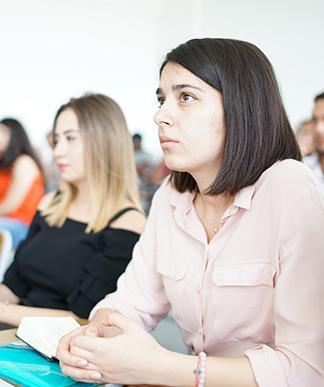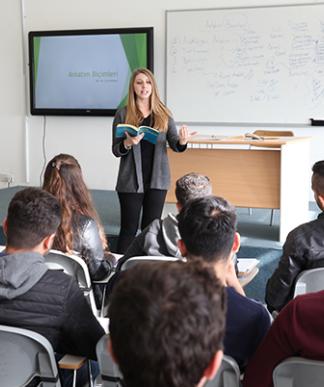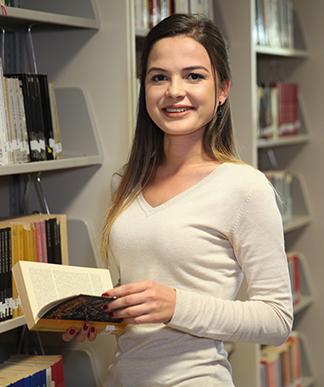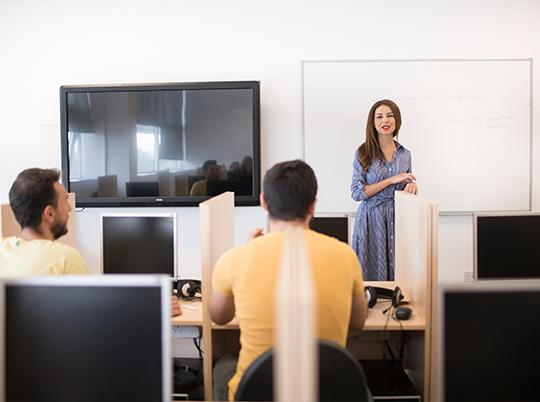


About the Program
The mission of Classroom Teaching is to train creative teachers who can think critically, have advanced problem solving, communication and research skills, and are digitally literate, in line with the teacher profile needed by the 21st century. The classroom teaching program trains teachers who will teach primary school students in literacy, mathematics, social studies, science, physical education, music, root values and other disciplines. In addition to the theoretical courses, there are practical courses in the curriculum of the Classroom Teaching program. With the vision of "Learner Centricity" and 21st Century teacher training, teacher candidates regularly cooperate with private or public primary schools under the Ministry of National Education and are supported to gain multidimensional experience during their studies. Thus, opportunities are provided for the development of personal qualities as well as professional qualifications.
Education Opportunities
Cyprus International University offers a variety of opportunities to help students graduate with the highest qualifications in their careers. During their 4-year undergraduate education, teacher candidates take courses in faculty basic, faculty elective, field basic, field elective and university elective.Courses that include content knowledge, curriculum knowledge and pedagogical content knowledge help students to have academic thinking skills and an intellectual approach. Starting from the second year, students are offered the chance to double major in order to obtain a diploma from departments such as law, psychology, Turkish Language and Literature.

Career Areas
Students who graduate from the Classroom Teaching Program work in public and private schools. After undergraduate education, graduates have the chance to pursue an academic career in their own fields or other fields of education such as special education and pre-school education. Graduates who pursue an academic career have the chance to work as a research assistant and subsequently as a lecturer in many higher education institutions. In terms of professional promotion, teachers can rise to the position of manager depending on their own effort and experience in both private and public schools. In addition, they can have a career change in the relevant units of the Ministry of National Education. In addition, classroom teaching graduates work as educational consultants in various large organizations. Graduates also have the opportunity to write scientific books in the field in cooperation with educational institutions and printing houses.
Contact
Faculty of Education
Çevik Uraz Center, CU 237
Tel: +90 392 671 1111 Extension: 2701
Faculty E-mail: secretary-foe@ciu.edu.tr
Head of Department: Asst. Prof. Dr. Sarem ÖZDEMİR
Head of Department E-mail: sozdemir@ciu.edu.tr
Compulsory Courses
First Semester
INFORMATION TECHNOLOGIES
Course code
BILT123Credit
3Theoretical
3Practical
0Ects
5SOCIOLOGY OF EDUCATION
Course code
EGIT111Credit
2Theoretical
2Practical
0Ects
3INTRODUCTION TO EDUCATION
Course code
EGIT121Credit
2Theoretical
2Practical
0Ects
3ENGLISH LANGUAGE-I
Course code
INGL151Credit
2Theoretical
2Practical
0Ects
3İLKOKULDA TEMEL MATEMATIK
Course code
SOEG101Credit
3Theoretical
3Practical
0Ects
4BASIC SCIENCES IN PRIMARY SCHOOL
Course code
SOEG111Credit
3Theoretical
3Practical
0Ects
5ATATÜRK PRINCIPLES AND HISTORY OF TURKISH REFORMS-I
Course code
TARH101Credit
2Theoretical
2Practical
0Ects
3TURKISH LANGUAGE - I
Course code
TREG121Credit
2Theoretical
2Practical
0Ects
4Second Semester
PHILOSOPHY OF EDUCATION
Course code
EGIT104Credit
2Theoretical
2Practical
0Ects
3EDUCATIONAL PSYCHOLOGY
Course code
EGIT122Credit
2Theoretical
2Practical
0Ects
3ENGLISH LANGUAGE-II
Course code
INGL152Credit
2Theoretical
2Practical
0Ects
3ENVIRONMENTAL EDUCATION
Course code
SOEG102Credit
3Theoretical
2Practical
1Ects
4TÜRKIYE COĞRAFYASI VE JEOPOLITIĞI
Course code
SOEG112Credit
2Theoretical
2Practical
0Ects
4COMMUNITY SERVICE PRACTICES
Course code
SOSH100Credit
2Theoretical
1Practical
2Ects
3ATATÜRK PRINCIPLES AND HISTORY OF TURKISH REFORMS-II
Course code
TARH102Credit
2Theoretical
2Practical
0Ects
3TURKISH HISTORY AND CULTURE
Course code
TARH112Credit
2Theoretical
2Practical
0Ects
3TURKISH LANGUAGE-II
Course code
TREG122Credit
2Theoretical
2Practical
0Ects
4Third Semester
RESEARCH METHODS IN EDUCATION
Course code
EGIT227Credit
2Theoretical
2Practical
0Ects
4TEACHING TECHNOLOGIES
Course code
EGIT233Credit
2Theoretical
2Practical
0Ects
4DRAMA IN PRIMARY SCHOOL
Course code
SOEG201Credit
2Theoretical
2Practical
0Ects
4SCIENCE LAB APPLICATIONS
Course code
SOEG203Credit
2Theoretical
2Practical
1Ects
4FIRST READING AND WRITING EDUCATION
Course code
SOEG205Credit
3Theoretical
3Practical
0Ects
5FREE ELECTIVE
Course code
SSECXX1Credit
2Theoretical
2Practical
0Ects
5UNIVERSITY ELECTIVE
Course code
UNISXX1Credit
3Theoretical
3Practical
0Ects
4Fourth Semester
PRINCIPLES AND METHODS OF TEACHING
Course code
EGIT206Credit
2Theoretical
2Practical
0Ects
4MEASUREMENT AND EVALUATION IN EDUCATION
Course code
EGIT224Credit
2Theoretical
2Practical
0Ects
4CHARACTER AND VALUE EDUCATION
Course code
OOEG428Credit
2Theoretical
2Practical
0Ects
3GAME AND PHYSICAL ACTIVITIES TEACHING
Course code
SOEG202Credit
2Theoretical
2Practical
0Ects
5TURKISH TEACHING
Course code
SOEG204Credit
3Theoretical
3Practical
0Ects
5FREE ELECTIVE
Course code
SSECXX2Credit
2Theoretical
2Practical
0Ects
5UNIVERSITY ELECTIVE
Course code
UNISXX2Credit
3Theoretical
3Practical
0Ects
4Fifth Semester
CLASSROOM MANAGEMENT
Course code
EGIT301Credit
2Theoretical
2Practical
0Ects
4CURRICULUM DESIGN IN EDUCATION
Course code
EGIT335Credit
2Theoretical
2Practical
0Ects
3MATHEMATICS TEACHING-I
Course code
SOEG303Credit
3Theoretical
3Practical
0Ects
5SCIENCE TEACHING
Course code
SOEG305Credit
3Theoretical
3Practical
0Ects
4AREA ELECTIVE
Course code
SOEGXX1Credit
2Theoretical
2Practical
0Ects
5FREE ELECTIVE
Course code
SSECXX3Credit
2Theoretical
2Practical
0Ects
5UNIVERSITY ELECTIVE
Course code
UNISXX3Credit
3Theoretical
3Practical
0Ects
4Sixth Semester
TURKISH EDUCATION SYSTEMS AND SCHOOL MANAGEMENT
Course code
EGIT326Credit
2Theoretical
2Practical
0Ects
3SPECIAL EDUCATION AND INCLUSION
Course code
OZEG322Credit
2Theoretical
2Practical
0Ects
3SOCIAL KNOWLEDGE TEACHING
Course code
SOEG302Credit
3Theoretical
3Practical
0Ects
5MATHEMATICS TEACHING-II
Course code
SOEG304Credit
3Theoretical
3Practical
0Ects
5RELIGIOUS CULTURE AND MORAL KNOWLEDGE TEACHING
Course code
SOEG306Credit
2Theoretical
2Practical
0Ects
5LIFE SCIENCE TEACHING
Course code
SOEG316Credit
2Theoretical
2Practical
0Ects
4AREA ELECTIVE
Course code
SOEGXX2Credit
2Theoretical
2Practical
0Ects
5Seventh Semester
GUIDANCE IN SCHOOLS
Course code
EGIT403Credit
2Theoretical
2Practical
0Ects
3TEACHING PRACTICE-I
Course code
SOEG401Credit
5Theoretical
2Practical
6Ects
10MUSIC TEACHING
Course code
SOEG407Credit
3Theoretical
3Practical
0Ects
3AREA ELECTIVE
Course code
SOEGXX3Credit
2Theoretical
2Practical
0Ects
5AREA ELECTIVE
Course code
SOEGXX4Credit
2Theoretical
2Practical
0Ects
5FREE ELECTIVE
Course code
SSECXX4Credit
2Theoretical
2Practical
0Ects
5Eighth Semester
TEACHING PRACTICE-II
Course code
SOEG402Credit
5Theoretical
2Practical
6Ects
10VISUAL ARTS TEACHING
Course code
SOEG406Credit
3Theoretical
3Practical
0Ects
5FOREIGN LANGUAGE TEACHING IN PRIMARY SCHOOL
Course code
SOEG418Credit
2Theoretical
2Practical
0Ects
4AREA ELECTIVE
Course code
SOEGXX5Credit
2Theoretical
2Practical
0Ects
5AREA ELECTIVE
Course code
SOEGXX6Credit
2Theoretical
2Practical
0Ects
5Elective Courses
EVALUATION OF IN-CLASS LEARNING
Course code
EGIT365Credit
2Theoretical
2Practical
0Ects
3COMPARATIVE EDUCATION
Course code
EGIT353Credit
2Theoretical
2Practical
0Ects
4CURRICULUM DESIGN IN EDUCATION
Course code
EGIT335Credit
2Theoretical
2Practical
0Ects
3TRADITIONAL CHILDREN'S GAMES
Course code
SOEG314Credit
2Theoretical
2Practical
0Ects
4SUSTAINABLE DEVELOPMENT AND EDUCATION
Course code
EGIT359Credit
2Theoretical
2Practical
0Ects
4INVESTIGATION OF ELEMENTARY SCHOOL TEXTBOOKS
Course code
SOEG315Credit
2Theoretical
2Practical
0Ects
SCIENCE AND RESEARCH ETHICS
Course code
TEIB220Credit
2Theoretical
2Practical
0Ects
3Disasters and Disaster Management
Course code
SOEG311Credit
2Theoretical
2Practical
0Ects
4ADDICTION AND ADDICTION STRUGGLE
Course code
EGIT361Credit
2Theoretical
2Practical
0Ects
3MEDIA LITERACY
Course code
BOTE359Credit
2Theoretical
2Practical
0Ects
DRAMA IN EDUCATION
Course code
EGIT346Credit
2Theoretical
2Practical
0Ects
4CHILDREN AND EDUCATION IN TURKISH CULTURE
Course code
SOEG322Credit
2Theoretical
2Practical
0Ects
4CHILD PSYCHOLOGY
Course code
EGIT325Credit
2Theoretical
2Practical
0Ects
4ADULT EDUCATION AND LIFELONG LEARNING
Course code
EGIT360Credit
2Theoretical
2Practical
0Ects
4CAREER PLANNING AND DEVELOPMENT
Course code
EGIT215Credit
2Theoretical
2Practical
0Ects
3.
Course code
OZEG377Credit
2Theoretical
2Practical
0Ects
4HISTORY OF SCIENCE AND PHILOSOPHY
Course code
EGIT362Credit
2Theoretical
2Practical
0Ects
6MORALITY AND ETHICS IN EDUCATION
Course code
EGIT323Credit
2Theoretical
2Practical
0Ects
3TECHNOLOGY AND ADULT EDUCATION
Course code
BOTE362Credit
2Theoretical
2Practical
0Ects
4EDUCATION OF CHILDREN AT RISK
Course code
OOEG350Credit
2Theoretical
2Practical
0Ects
4HAPPINESS
Course code
EGIT424Credit
2Theoretical
2Practical
0Ects
3TR Applicants
TR Students who are successful in the exams conducted by the Higher Education Council Student Selection and Placement Center (ÖSYM) and are entitled to enroll in our university in line with their preferences can complete the registration process with the necessary documents for registration from our Registration and Liaison Offices throughout Turkey or from the Marketing Directorate on campus.
Click for detailed admission requirements information.
CIU offers many scholarships and discounts in undergraduate programs.
TR Applicants
• Click here for scholarships that encourage and reward success and more.
Tuition Fees are determined at the beginning of each academic year. Candidate students who are entitled to enroll in CIU can learn their fees in line with the Tuition Fee Calculation system.